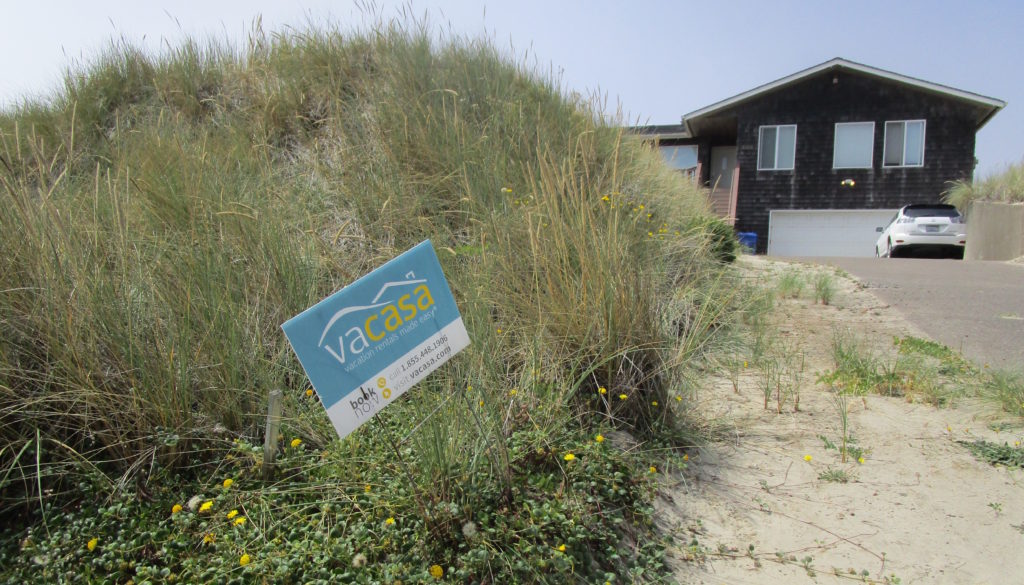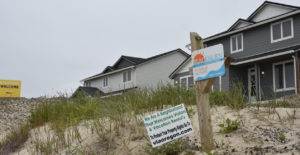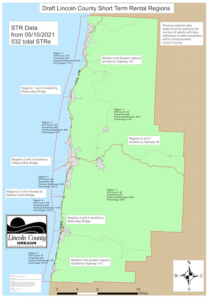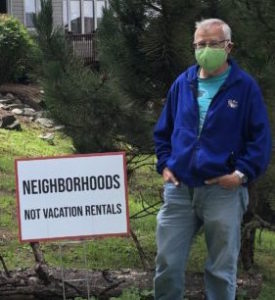
By QUINTON SMITH/YachatsNews.com
Frustrated by delays from Lincoln County commissioners, a group opposed to vacation rentals in residential neighborhoods has qualified its initiative petition phasing them out for the Nov. 2 ballot.
The “15neighborhoods” group has been collecting signatures for more than a year to put its initiative to a countywide vote. But it held off filing to give the county time to work on changing its ordinances.
While all voters in the county would get to cast ballots, the initiative affects only short-term rentals in unincorporated Lincoln County outside the seven cities.
Commissioners have not completed that work, continually delaying deadlines, the last time in May when it missed a self-imposed June 1 goal to enact new regulations. Commissioners then gave themselves another deadline – Nov. 30.
“We held off for many months to let the county try to solve the problem, but became frustrated by the lack of meaningful action,” Jim Peterson, a 15neighborhoods board member who lives in the Miroco neighborhood south of Depoe Bay, told YachatsNews. “After more than two years, there is no end in sight. We filed the ballot measure because the board of commissioners was not acting, and we in the residential neighborhoods infested by short-term rentals are suffering the consequences of their inaction.”
The Lincoln County clerk’s office completed the signature verification process Wednesday, and announced the initiative had qualified for the November ballot. The required number of signatures was 1,454, Clerk Dana Jenkins said, the group turned in 1,714 signatures, 1,566 were accepted and 148 were rejected.

The initiative will likely lead to an acrimonious fall campaign.
A group formed last year by vacation rental managers and owners, ViaOregon, has already tried to make its case with a website, an economic study, testimony to the county, and hundreds of lawn signs supporting such rentals.
Its work is intended to match the 15neigborhoods effort, a grassroots organization which began in 2020 with its own website, lawn signs and barrage of letters to local news outlets.
The burgeoning number of vacation rentals in tourist-oriented communities has become an issue across the country, not just in Lincoln County.
Owners and managers see short-term rentals as a way to enhance a visitor’s experience compared with motels, help pay mortgages and upkeep, create more jobs and investment opportunities.
But vacation rentals clustered in some areas can change the character of residential neighborhoods with a steady turnover of guests, houses that hold 8-16 people instead of the typical 2-3, parking, noise, traffic and other issues.
The issue became more pronounced in unincorporated areas of Lincoln County in the past three years as cities from Yachats to Lincoln City limited licenses and tightened other regulations. That led to a nearly tripling of licenses in unincorporated areas to 600 – and more complaints from some neighborhoods.
In the 18 months since the license moratorium, the number of active rentals in unincorporated county has dropped to 529, according to the sheriff’s office.
What the initiative would do
If approved by all voters in Lincoln County, the initiative:
- Would apply only in the unincorporated areas of the county, not cities;
- The county would not issue new licenses in residential neighborhoods zoned for residential (R-1-A, R-1 and R-2) use.
- Short term rentals in the three zones would become “non-conforming uses,” would be limited to owners of record at the time the use became non-conforming, would not be transferable to new owners, and would be phased out within five years, with some hardship exemptions available.
- Provide a process in which R-1-A, R-1 and R-2 subdivisions may be down-zoned to allow for short-term rentals.
- People would be limited to having only one ownership interest in a short-term rental within the R-1-A, R-1 and R-2 zones.
- Would decrease rental occupancy limits from three per sleeping area plus an additional two people, to two persons per sleeping area. Overall, occupancy would be based upon the number of bedrooms, parking spaces, and septic system capacity.
In a statement later Wednesday, the 15neighborhoods group said it “agrees that short-term rentals have a place in Lincoln County, but let’s be realistic. STRs are mini-motels that belong in the tourist commercial zones and higher-density residential zones of unincorporated Lincoln County. This measure does not limit the total number of STRs in the county, only in zones R-1-A, R-1 and R-2. STRs simply do not belong in these quiet, low-density, residentially-zoned neighborhoods designed for families, not businesses.”
The history and county’s effort
County commissioners began working on short-term rental regulations in early 2019, putting a moratorium on new licenses in March 2020 and holding workshops to gather comments.
But the start of the coronavirus pandemic in March 2019 and September 2020 wildfires in Otis delayed much of the work – and four times commissioners extended the moratorium and their deadlines to finish the regulations.

Last November, County Counsel Wayne Belmont came back to commissioners with suggestions in 4-5 areas of regulation that represented a much further tightening than previous ideas. At the time commissioners had a Dec. 31 deadline. They pushed that to June 1 and then in May extended it to Nov. 30.
When they were last discussed this spring Belmont proposals included:
A cap on licenses: County staff had proposed some sort of limit on the number of licenses – but did not say or receive direction whether it will be at the current number or something larger or smaller. Staff also proposed breaking the county into seven zones, and putting caps in individual areas – possibly with an overall number for the whole county.
Occupancy limits: Lincoln County currently has one of the most lenient short-term rental occupancy limits in Oregon – three people per sleeping area and two additional guests. Belmont initially proposed an occupancy limit of two people per sleeping area and no additional guests. That changed in May when he suggested a limit of two people per bedroom and “possibly an additional two people.” That means, for example, a three-bedroom rental which currently has a limit of 11 guests would be limited to eight.
Septic systems: An initial inspection of septic systems on all short-term rentals and then some type of regular re-check after that. The initial check would also serve to establish a capacity for the number of rental guests.
Code enforcement: Belmont said this is the area that needed the most work. County staff and the sheriff’s office, which currently handles enforcement, are proposing an administrative hearings officer to handle complaints and establishing a “three strikes” program to pull licenses of chronic offenders.
Although county commissioners complained each time they extended their deadlines in 2020, on Tuesday they defended their work when asked by YachatsNews to comment.
Responding to the pandemic, the wildfires, budget issues and current negotiations with five of six employee unions has consumed most of their time, said commissioners Doug Hunt and Claire Hall.
“Our board has been working toward a comprehensive solution to the issues posed by short-term rentals,” Hall said in an email. “We put a moratorium on new licenses in place in order to give us time to come up with a plan that will address capping licenses, reducing occupancy limits, dealing with septic issues and a stronger mechanism for enforcement. The pandemic and wildfire recovery has taken a great amount of bandwidth in our office, but we have continued to move forward on this.”

Hunt said in an interview that “significant distractions” forced commissioners to move its deadlines, but that he believes the county can finish its work by Nov. 30.
“That continues to be our goal and hopefully we’ll meet it,” Hunt said. “It’s a very complicated problem and we’re trying to address the issues that come with it.”
Work on the issue has also been slowed by Belmont’s retirement in early July. The county is interviewing candidates for the new position of county administrator and Belmont has agreed to work under contract on issues like short-term rental regulations in late August or early September.
STR group warns of economic damage
When asked to comment Wednesday, VIA Oregon was also critical of the county’s process and progress but stressed a ban could harm the local economy.
“Via Oregon has asked to workshop this matter with the sponsor of the ballot measure and county commissioners on multiple occasions and have been met with resistance,” the group said in a statement. “We have asked our commissioners to look at the real numbers and true economic impact to our community.
“We take our communities’ concerns very seriously and support the creation of good policy. When studying effective policies on vacation rentals across the country it’s clear burdensome regulations or bans, including caps, only result in driving the industry underground and increasing the cost of enforcement for all Lincoln county taxpayers.
Pointing to an economic study it commissioned that claimed 20 percent of employment in Lincoln County was tied to the vacation rental industry, the group said “Approving this ballot measure without understanding the consequences will be very unfortunate for the economy of the county.”
What 15neighborhoods had to say
But the 15neighborhoods group blasted the lack of progress and said commissioners should have found ways to finish the work.
“… the petition was filed because of inaction by the board of commissioners … Not just since this May, but since May of 2020,” said Peterson.

“The board of commissioners said in May of 2019 that they wanted to have a comprehensive plan to update STR regulations by the end of 2019, and hopefully sooner. The Covid problem came after their goal had already been missed. It justifiably slowed their overall comprehensive planning in 2020, but a few simple measures such as lowering occupancies could easily have been taken before Covid emerged.”
Peterson said commissioners agreed in principle with Belmont that reducing occupancy levels could solve many of the problems generating the most complaints about vacation rentals — but never acted to change them.
“Consequently, STRs have been allowed to continue operations at excessive occupancies for another year and a half, with the same disruption of neighborhoods,” Peterson said.
Peterson said other than the moratorium on licenses “We have still not seen any proposals for reform other than general statements.”
“The board of commissioners in repeated meetings has asked for more information, but has failed to ever discuss any details, let alone act on anything,” he said. “For example, they have repeatedly mentioned the concept of capping license numbers, yet have never had a meaningful discussion on something so fundamental as whether a cap should be at the existing number, or lower, or higher. It appears as if they are waiting to have a proposal that they can simply vote yea or nay on, without any active engagement on their part.
“They are offering no guidance, and no indication of their views. For many months now, they will not even engage with constituents on the subject, insisting that people simply post opinions on a county web page,” Peterson said. “That soon becomes unproductive.
“The so-called workshops were nothing of the kind. County staff presented a few generalized concepts and people were given three minutes to make statements, but there was no give and take, no discussion, and no visible engagement by the commissioners.”



STR’s don’t belong in neighborhoods. We had one on the end of my street and it ranged from nice people to extremely rude inconsiderate jerks every weekend. Fortunately the homeowners moved into it recently and its no longer a STR.